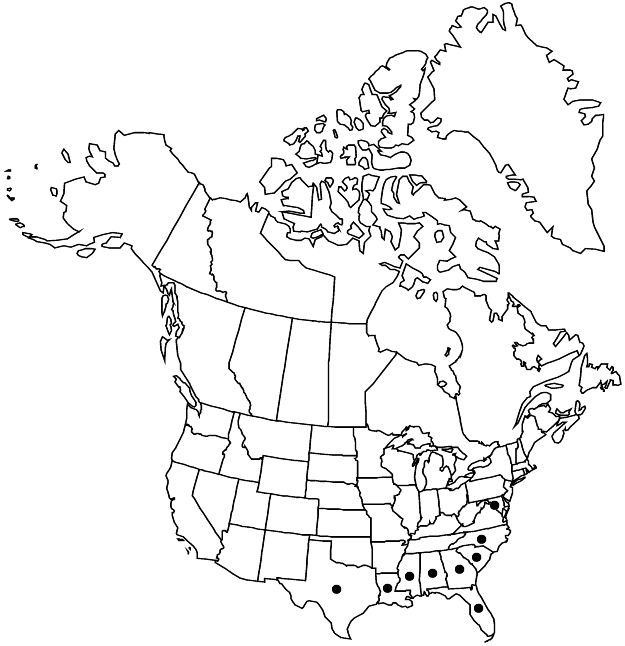Difference between revisions of "Linum floridanum var. floridanum"
FNA>Volume Importer |
imported>Volume Importer |
||
| (6 intermediate revisions by 2 users not shown) | |||
| Line 1: | Line 1: | ||
{{Treatment/ID | {{Treatment/ID | ||
|accepted_name=Linum floridanum var. floridanum | |accepted_name=Linum floridanum var. floridanum | ||
| − | |accepted_authority= | + | |accepted_authority= |
|publications= | |publications= | ||
|common_names=Florida yellow flax | |common_names=Florida yellow flax | ||
| Line 8: | Line 8: | ||
|name=Cathartolinum macrosepalum | |name=Cathartolinum macrosepalum | ||
|authority=Small | |authority=Small | ||
| + | |rank=species | ||
}} | }} | ||
|hierarchy=Linaceae;Linum;Linum sect. Linopsis;Linum floridanum;Linum floridanum var. floridanum | |hierarchy=Linaceae;Linum;Linum sect. Linopsis;Linum floridanum;Linum floridanum var. floridanum | ||
| Line 23: | Line 24: | ||
|elevation=0–150 m. | |elevation=0–150 m. | ||
|distribution=Ala.;D.C.;Fla.;Ga.;La.;Miss.;N.C.;S.C.;Tex.;West Indies (Jamaica). | |distribution=Ala.;D.C.;Fla.;Ga.;La.;Miss.;N.C.;S.C.;Tex.;West Indies (Jamaica). | ||
| − | |discussion=<p>According to C. M. Rogers (1984), var. floridanum can be distinguished from Linum intercursum by its completely developed false septa that lack cilia and by its more numerous leaves. It can be distinguished from L. medium var. texanum (often misidentified as L. floridanum) by its pyriform capsule. Rogers noted that L. floridanum has subspheric, multiporate pollen, whereas L. medium var. texanum has subtriangular, tricolpate pollen. The records from the District of Columbia and Texas require confirmation; the species is otherwise not known from north of North Carolina or west of central Louisiana (B. A. Sorrie, pers. comm.).</p> | + | |discussion=<p>According to C. M. Rogers (1984), <i></i>var.<i> floridanum</i> can be distinguished from <i>Linum intercursum</i> by its completely developed false septa that lack cilia and by its more numerous leaves. It can be distinguished from <i>L. medium </i>var.<i> texanum</i> (often misidentified as <i>L. floridanum</i>) by its pyriform capsule. Rogers noted that <i>L. floridanum</i> has subspheric, multiporate pollen, whereas <i>L. medium </i>var.<i> texanum</i> has subtriangular, tricolpate pollen. The records from the District of Columbia and Texas require confirmation; the species is otherwise not known from north of North Carolina or west of central Louisiana (B. A. Sorrie, pers. comm.).</p> |
|tables= | |tables= | ||
|references= | |references= | ||
| Line 32: | Line 33: | ||
-->{{#Taxon: | -->{{#Taxon: | ||
name=Linum floridanum var. floridanum | name=Linum floridanum var. floridanum | ||
| − | + | |authority= | |
| − | |authority= | ||
|rank=variety | |rank=variety | ||
|parent rank=species | |parent rank=species | ||
| Line 47: | Line 47: | ||
|publication year= | |publication year= | ||
|special status= | |special status= | ||
| − | |source xml=https:// | + | |source xml=https://bitbucket.org/aafc-mbb/fna-data-curation/src/2e0870ddd59836b60bcf96646a41e87ea5a5943a/coarse_grained_fna_xml/V12/V12_709.xml |
|genus=Linum | |genus=Linum | ||
|section=Linum sect. Linopsis | |section=Linum sect. Linopsis | ||
Latest revision as of 19:17, 5 November 2020
Flowers: anthers 0.5–1.2 mm. Capsules pyriform, 2–3 mm, walls relatively thin, apex obtuse. Seeds 1.6–2.1 mm. 2n = 36.
Phenology: Flowering Jun–Oct.
Habitat: Open pine and pine-palmetto woodlands, pine savannas, sandhill seeps.
Elevation: 0–150 m.
Distribution

Ala., D.C., Fla., Ga., La., Miss., N.C., S.C., Tex., West Indies (Jamaica).
Discussion
According to C. M. Rogers (1984), var. floridanum can be distinguished from Linum intercursum by its completely developed false septa that lack cilia and by its more numerous leaves. It can be distinguished from L. medium var. texanum (often misidentified as L. floridanum) by its pyriform capsule. Rogers noted that L. floridanum has subspheric, multiporate pollen, whereas L. medium var. texanum has subtriangular, tricolpate pollen. The records from the District of Columbia and Texas require confirmation; the species is otherwise not known from north of North Carolina or west of central Louisiana (B. A. Sorrie, pers. comm.).
Selected References
None.